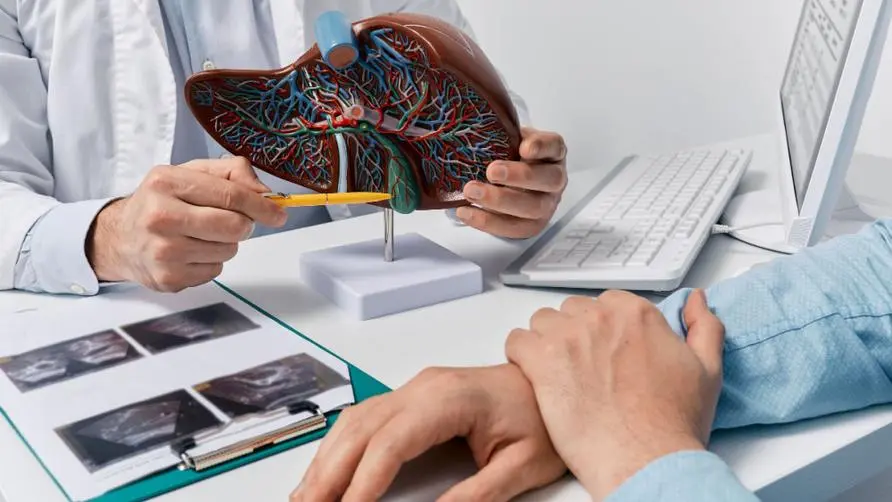Are "millions" of people in Taiwan at risk of liver cancer? Oncologists warn: Binge drinking of "1 drink" may cause liver cancer trilogy

Abdominal pain is often already late when you seek medical attention! The 5-year survival rate of liver cancer is less than 10%
Liver cancer has been among the top 10 cancer-related deaths in Taiwan for more than 20 years. The death rate has been ranked second for many years, and there is a trend of getting younger. It is clear that the prevention and treatment of liver cancer is a health issue that cannot be ignored. The liver is often called a “silent organ” because it has no pain-sensing nerves. When patients present with symptoms such as jaundice and acute abdominal pain, the disease has often progressed to an advanced stage and does not respond well to chemotherapy and targeted drug treatments. In the past, the 5-year survival rate of liver cancer did not exceed 10%, which became the biggest dilemma in treatment.
In recent years, immunotherapy has become a new force in cancer treatment. Dr. Chen Sanqi from the Department of Oncology, Taipei Veterans General Hospital, said that in clinical practice, he encountered a 40-year-old patient who had poor results with targeted therapy and chose to switch to “immunocombination therapy”. , not only did the tumor disappear after 4 months, but there was no sign of recurrence under continuous monitoring. Such cases were almost unheard of in the past.
Dr. Chen Sanqi reminded that even if the treatment continues to make breakthroughs, daily health prevention must not be forgotten, especially during festivals and not to drink too much and affect your health. On the recent World Wine Day (May 25), many people will drink wine uncontrollably on the pretext that drinking wine is good for health. However, according to WHO recommendations, excessive amounts of any alcohol can become disease-causing factors.
Millions of people may get sick if they drink too much! Drinking alcohol increases the risk of death among carriers by 10 times
According to data from the Taiwan Ministry of Health and Welfare, there are approximately 8.5 million people in Taiwan who drink alcohol, of which as many as 1 million people engage in excessive drinking and “binge drinking”; the drinking rate among Taiwanese college students is as high as 44%. Excessive drinking is a risk factor for many diseases, and the organ most directly affected is the “liver” responsible for metabolizing alcohol. Regular drinking may increase the incidence of the “trilogy of liver diseases”: chronic hepatitis, cirrhosis, and liver cancer.
Studies have pointed out that the risk of liver disease in people with alcoholism is up to 20% higher than that of ordinary people. And if people who are carriers of liver disease drink excessively for a long time, the risk of dying from liver cancer is dozens of times higher than that of ordinary people. Data point out that because it is often discovered late, only about 20% of Taiwanese liver cancer patients can undergo surgical resection when diagnosed. Therefore, the diversified development of advanced liver cancer treatment is very important for current clinical applications.
Liver cancer has been ranked second among the top ten causes of cancer death for many years, and more than 10,000 people suffer from the disease every year. It is a health issue that needs urgent attention in Taiwan. Dr. Chen Sanqi explained that before hepatitis B and C viruses and alcohol and other important risk factors cause liver cancer, there will often be a period of chronic hepatitis. After several hepatitis attacks, the liver will fibrosis to form cirrhosis, and then cancer will slowly develop. However, since the liver does not have pain-sensing nerves, most patients do not notice it until they feel it, but they are already unable to recover.
40% of patients are in the middle and late stages when 8 symptoms appear. Three high-risk groups should be screened regularly.
Dr. Chen Sanqi said that the age of onset of liver cancer is usually between 20 and 50 years old. The early symptoms are not obvious. In the late stage, symptoms such as upper abdominal pain, loss of appetite, abdominal distension, weight loss, bloody stools, jaundice and acute abdominal pain will appear one after another. In severe cases, it may even Vomiting blood, most patients only realize that there is something wrong with their body. According to clinical experience, about 40% of patients are already in the mid-to-late stage when diagnosed, and they will encounter more difficulties in treatment. Therefore, high-risk groups who drink frequently, have a medical history in the family, or are carriers of hepatitis B or C should be screened and tracked regularly. .
In addition, data also points out that the one-year survival rate of patients with advanced liver cancer is only 10%. The effectiveness of past treatments has been limited. Even after targeted drug treatment, the tumor shrinkage rate is only about 5%-20%. As a result, the survival rate of patients with advanced liver cancer has never been improved. . Dr. Chen Sanqi added that after receiving targeted drug treatment, patients will gradually develop drug resistance within a few months. Almost all patients will face this problem within a year, but there are no treatment options that can effectively improve the patient’s survival rate. This is The biggest dilemma in the treatment of advanced liver cancer is currently.
Immunocombination therapy nearly doubles survival time, providing new hope for patients with advanced liver cancer
In recent years, with the development of medical treatment, immunotherapy has also joined the ranks of treatment for advanced liver cancer, becoming a breakthrough point in overcoming the previous dilemma of low survival rate and poor prognosis. Research points out that after patients with advanced liver cancer are treated with the combined therapy of “immune + immune”, one out of every three patients has a tumor shrinkage, which means that the tumor shrinkage rate exceeds 30%.
Dr. Chen Sanqi shared that in clinical trials, about 50% of patients with hepatocellular carcinoma who had previously been treated with targeted drugs were treated with second-line immune combination therapy to extend their survival to nearly 2 years. This is consistent with past data. It can be said to be a substantial improvement. In addition, the side effects of treatment are relatively mild, and patients can maintain a better quality of life.
Dr. Chen Sanqi further shared that in the past, he had encountered a patient with hepatitis B carriers in clinical practice. He had a daily drinking habit due to work. He was diagnosed with advanced liver cancer during a physical examination when he was about 40 years old. At that time, targeted drug treatment was used, but the cancer cell index continued to rise. After discussing with the patient, we decided to try combined immune therapy. After the treatment, not only did the tumor shrink successfully, but the tumor completely disappeared 4 months later, and there was no recurrence in follow-up. .
Recently, as more and more patients are using this therapy and more and more successful cases have emerged, the medical community is also optimistic that in the future, immunotherapy combination therapy will have the opportunity to be included in health insurance, giving patients with advanced liver cancer the opportunity to extend their survival and turn their lives around. Dr. Chen Sanqi reminds that if you have the above-mentioned liver cancer risk factors, in addition to early screening and follow-up to stay away from liver cancer, there is no need to panic if you encounter cancer. You should discuss the most appropriate treatment methods with your doctor to help you get rid of the threat of cancer as soon as possible.
Further reading:





